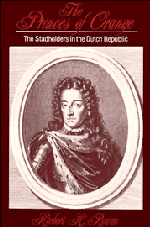Book contents
- Frontmatter
- Contents
- List of illustrations
- Preface
- Prologue: lieutenants of the crown
- 1 William I: from courtier to rebel
- 2 Maurice of Nassau: defender of the Republic
- 3 Frederick Henry: firm in moderation
- 4 William II: the challenger
- 5 The first stadholderless period: 1 exclusion
- 6 The first stadholderless period: 2 return
- 7 William III: stadholder and king
- 8 The second stadholderless period: doldrums
- 9 William IV: neither revolutionary nor reformer
- 10 William V: the era of Anna and Brunswick
- 11 William V: the Patriot challenge
- Epilogue: consequences and conclusions
- Bibliography
- Index
- Title in series
3 - Frederick Henry: firm in moderation
Published online by Cambridge University Press: 01 June 2011
- Frontmatter
- Contents
- List of illustrations
- Preface
- Prologue: lieutenants of the crown
- 1 William I: from courtier to rebel
- 2 Maurice of Nassau: defender of the Republic
- 3 Frederick Henry: firm in moderation
- 4 William II: the challenger
- 5 The first stadholderless period: 1 exclusion
- 6 The first stadholderless period: 2 return
- 7 William III: stadholder and king
- 8 The second stadholderless period: doldrums
- 9 William IV: neither revolutionary nor reformer
- 10 William V: the era of Anna and Brunswick
- 11 William V: the Patriot challenge
- Epilogue: consequences and conclusions
- Bibliography
- Index
- Title in series
Summary
The significance of Maurice's refusal to become count and duke in the United Provinces became clear with his death. Had he taken the crown when it was within his grasp, his brother Frederick Henry would have succeeded him as stadholder by established right. Now, however, Frederick Henry did not step at once into his brother's boots, but had to wait for the States to act.
There was no question about his succession in command of the army. He had been named deputy commander on 12 April, when Maurice's incapacity and approaching death had become evident, and then, when his brother was no more, he was appointed captain-general of the Union by the States General, as they had promised Maurice they would do. His command was therefore more extensive than Maurice's had been, for it included all troops in the service of the States General, including those in the northern provinces, where, however, all significant military operations had ceased. There was discontent in some of the provinces that the States General had not waited for their customary prior approval, but Holland pressed for Frederick Henry's universal command over the troops of the Union.
The haste with which Frederick Henry was given command came from two concerns. One was that no opportunity be given to the Spaniards to exploit a period of uncertainty. It was bad enough that they took Breda on 5 June; but Spinola was a bold general whose enterprising spirit there was every reason to fear.
- Type
- Chapter
- Information
- The Princes of OrangeThe Stadholders in the Dutch Republic, pp. 56 - 76Publisher: Cambridge University PressPrint publication year: 1988

